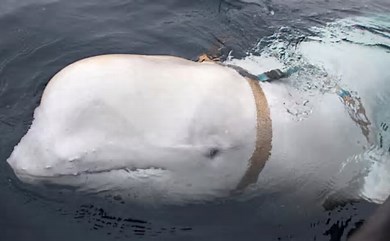Hvaldimir, the beluga whale found dead off the coast of Norway on August 31, has been confirmed to have died of non-human-related causes. Hvaldimir, named after the combination of the Norwegian word for whale and Russian President Vladimir Putin, gained fame in 2019 after being spotted wearing a harness, sparking jokes about being a ‘Russian spy.’
Whale Found with Stick in Mouth
Norwegian authorities launched an investigation into Hvaldimir’s death following reports from two animal rights groups alleging foul play. The autopsy revealed that a stick measuring 35 cm (14 in) in length and 3 cm (1.2 in) in width was lodged in the whale’s mouth. While the whale had suffered minor injuries, they were superficial and unrelated to its cause of death.
Empty Stomach and Deteriorating Organs
Further examination showed that Hvaldimir’s stomach was completely empty, and many of the whale’s organs had already deteriorated. Police for the South West district, who conducted the autopsy, stated that there was no indication of human involvement in the whale’s death.
Investigation Closed
As no evidence was found to support claims that the whale was shot or harmed by humans, the police have decided not to pursue further investigation. The full autopsy report is expected to be released within two weeks, but authorities are confident that no human activity directly contributed to Hvaldimir’s death.
Hvaldimir had been a subject of intrigue since 2019 when it was first found near Norway’s Arctic coast wearing a harness. The unusual discovery led to speculation about the whale’s origins, with some suggesting it was part of a Russian military program.







